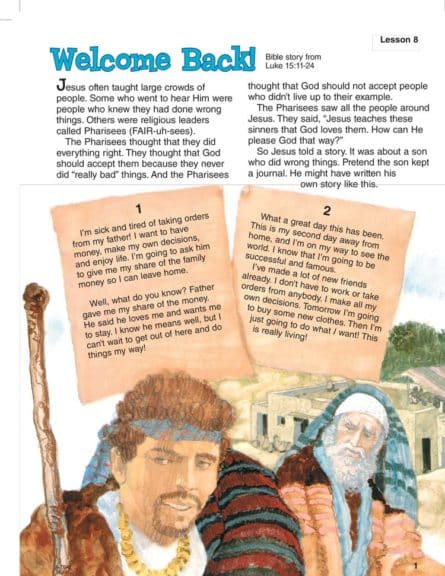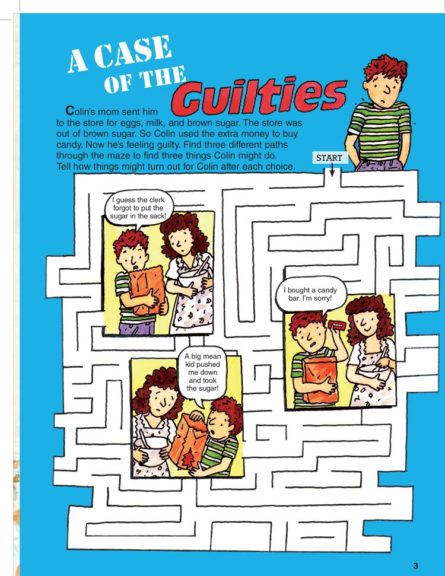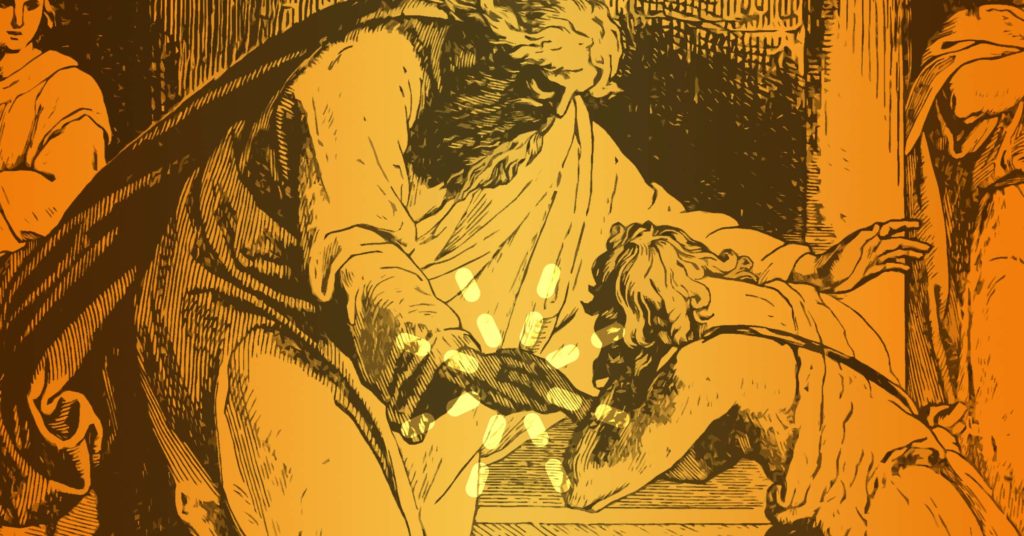Use this lesson outline to teach elementary students about Jesus’ parable of the prodigal son found in the book of Luke.
Editor’s Note: This lesson was adapted from Bible-in-Life, Elementary.
SCRIPTURE: Luke 15:11–24
FOCUS: Because God loves us, He forgives us.
Materials:
- Two craft sticks, marker
- Bible Discoveries activity sheet, Bibles, Pencils
- Bible Discoveries maze activity, Pencils

The Parable of the Prodigal Son Bible Background
Mosaic law dictated how an inheritance was to be divided: The eldest son received a double portion, and the other sons received an equal share. Land belonged to a family, not to an individual. Wills were therefore unnecessary. In the case of the prodigal son, everyone would have known that once the younger son used up his portion of the inheritance, there was nothing left that he could receive after his father’s death.
Under the Law of Moses, Jews were forbidden to eat pigs or even touch any dead ones (Lev. 5:2; 11:7-8). This prohibition developed into a loathing of the animal itself and a designation of “unclean” placed on people who dealt with pigs. Yet herds of pigs were found in the area of Palestine, raised in Gentile communities. To be compared to a pig was to be repugnant or godless (Prov. 11:22; Matt. 7:6; Mark 5:11-13). So the listeners of Jesus’ parable would readily recognize that the prodigal son had sunk to the lowest depth of morality by feeding pigs raised by a Gentile.
The negative reaction of the older son in Jesus’ parable may have been a comparison of the Pharisees’ negative attitude toward repentant sinners.
The father’s patience, acceptance, and forgiveness present a picture of our God. No matter what, He always meets us with open arms.
Bible Readiness
To connect their own experiences with wrongdoing and forgiveness to the Bible story about the prodigal son, the children will act out times of wrongdoing and forgiveness.
MATERIALS: Two craft sticks, marker
Today’s Bible story from Luke 15:11-24 about the prodigal son can help your students consider God’s unconditional love. Even though all of us are sinners, it might be difficult for some children to completely understand that their actions may be classified as sin. Deep down inside, they know when they have done wrong. They have also experienced having been punished for their wrongdoing. By using puppets, the children can act out situations and yet not feel the pressure since the “puppet” is the one doing the talking.
Before class, turn two craft sticks into “puppets” by drawing a smiley face at the top of each. Draw a frowny face on the back of each. Label the bottom of one stick “Me” and the other “A Grown-Up.”
Have your class gather into a large group on the floor as you begin today’s lesson. Try to include as many children as possible in the following activity. If a child is reluctant to participate, that’s okay. Encourage them to listen to the various exchanges. They still learn as they listen.
SAY: Think to yourself: Have you ever done something wrong? Of course, the answer is yes! We all have done wrong things. Think about a time when you did something wrong and the person in charge found out about it. What happened? Tell us with the help of some puppets.
You may want to be prepared to use the puppets first with a short exchange between the two puppets to help the children understand how to use them. Then ask for a pair of volunteers to begin, and give them the puppets. The “Me” puppet “tells” of a time he or she did something wrong. The grown-up puppet (whether parent, teacher, coach, etc.) responds as that adult really would. For example, the “Me” puppet might say, “I went to play down the street even after my dad told me I couldn’t go.” The grown-up puppet might say, “You’re grounded for the rest of the weekend!”
Let several pairs of children have a chance to act out a situation where they’ve done something wrong. Encourage them to have the adult puppet give responses that the children have actually received, whether positive or negative.
Then join everyone in discussion.
ASK:
- When you do something wrong, what do you expect will happen? (Some children may give specific examples of what happens when they are punished. Others may give some generalizations of what might happen. Accept all reasonable answers. Children may say: we expect we’ll get punished in some way; sometimes we’re afraid because we don’t know what will happen; sometimes no one will know about it and I’ll get away with it; I worry about it because I know I shouldn’t have done it; etc.)
- How would you really like to be treated after you’ve done something wrong? (We’d like the punishment to be fair; we’d like our side of the story to be heard; we’d like to be treated with respect; we’d like to know that the adult still likes us; we’d like to be forgiven; etc.)
Tie to the Bible
SAY: Our Bible story is about a young man who did something wrong to his dad. The young man expected the worst. Let’s see what happened.
Bible Study: Luke 15:11-24
Using the Bible and Bible Discoveries, children will study Luke 15:11-24: The prodigal son is forgiven.
MATERIALS: Bible Discoveries activity sheet, Bibles, Pencils

Gather the children into a group on the floor or at a table for today’s Bible story. Pass out pencils, Bibles, and Bible Discoveries.
Have them find the Book of Luke in their Bibles. Ask them to place a bookmark in their Bibles at Luke 15 for later use. If you have visitors in your class, be prepared to help them find the Scripture in the Bible. Show them the table of contents in the front of their Bible to help them in the future.
Ask for volunteers to take turns reading parts of the story. You might assign four specific readers for the four numbered sections and then you might narrate the rest. Or you could ask someone from your congregation to come and dramatically read the diary entries. When you come to the Bible symbol, have the entire class look up the Scripture reference. Have a volunteer read it aloud. Then as a class decide on the correct answer and have everyone fill in the blanks.
For your convenience, the correct answers are a robe, a ring, and sandals.
Bible Review Questions
- Who did Jesus tell this story to? Why? (Pharisees—they felt they were better than others and complained that Jesus was a friend to people who did wrong. Jesus wanted the Pharisees to see that God loves and welcomes those who ask Him to forgive them.)
- What did the son in the story do wrong? (He had a bad attitude about his family so he left them; he wasted the money his dad gave him.)
- How did the son expect the father to treat him? (The son didn’t know if his father would take him back, but the son hoped his father would at least let him be a servant.)
- How did the father treat his son? (His dad ran to meet him, hugged and kissed him, gave him clothes and a family ring, threw him a party, and joyfully forgave him.)
- How is God like the father in Jesus’ story? (Even when we do something wrong, God wants us to come back to Him and ask Him to forgive us; God is happy when we come back to Him.)
- According to the memory verse, what will happen if we admit our sins to God? (God will forgive us.)
Be sure the children understand that in order to become part of God’s family, we need to believe that Jesus died on the cross for our sins. Then we need to ask Him to come into our lives. After that, we sometimes still do wrong things. But God continues to forgive us if we admit our sins to Him. We still remain part of God’s family, and God is happy to be our Father.
Bible Activity
Children will investigate God’s forgiveness.
MATERIALS: Bible Discoveries maze activity, Pencils

To help the children consider real life situations they may face, have the children complete the maze in the Bible Discoveries maze activity attachment. When they finish they can talk about the consequences with another child.
Bible Response
To apply to their daily lives the Bible story of the prodigal son, children will decide to ask God for forgiveness.
After the children have cleaned up their activity, gather them back together.
SAY: When we do something wrong, we don’t have to be afraid that God will stop loving us. Whenever you feel bad about something wrong you did, you can freely go to God. Because God loves you, He will forgive you.
ASK:
- How does that make you feel? (Let volunteers answer. If some children prefer not to answer aloud, that’s okay. Encourage them to silently consider how this makes them feel. Children may say they feel relieved, happy, not worried any longer, etc.)
- How can knowing that God forgives us because He loves us make a difference in your life? (Help the children think through this idea. They may say: it could give me peace, give me courage to talk to Jesus when I’ve done something wrong, help me be more forgiving to others who have done wrong, etc.)
- What are some things you might want to ask God’s forgiveness for? (Don’t ask the children to answer this question aloud. Encourage them to think about it for a minute or two before you have a short time of prayer.)
Prayer Time
SAY: Let’s talk to God right now about His forgiving us. You can also pray at home.
Lead a prayer time by praying several unfinished sentences for the children to complete as they wish. The children may pray silently as you pause after each sentence. Pray sentences such as these:
- Father God, thank You for forgiving me for: (pause) __________
- Father God, please also forgive me for: (pause) __________
- Father God, thank You for this reminder of Your forgiveness: (pause) __________
Close the prayer time by thanking God for forgiving us and always loving us. If there are some children who wish to pray aloud as well, allow them to do so. Encourage children to pray throughout the week because they know God loves them and forgives them.
Seeing God throughout the Week
Encourage children to ask God to help them confess their sins and ask Him for forgiveness when they do wrong things. Remind them that God loves them and is faithful and just and will forgive their sins.
Need more parable lessons? We’ve got you covered!
Did you enjoy this lesson? It was adapted from Bible-in-Life for kids. To learn more about this curriculum, check out the video below or visit BibleinLife.com.
Explore every age level at BibleinLife.com!











